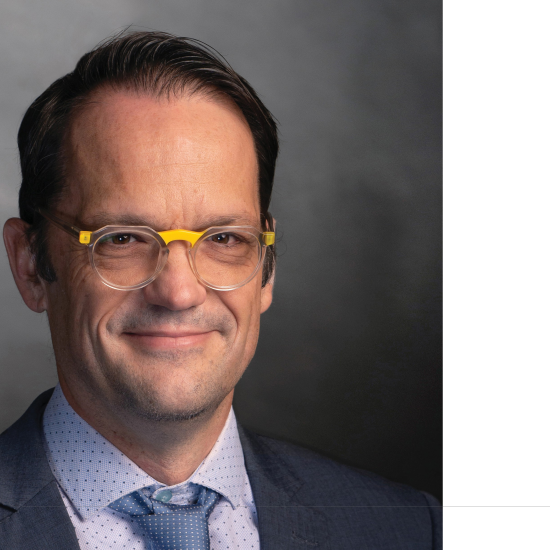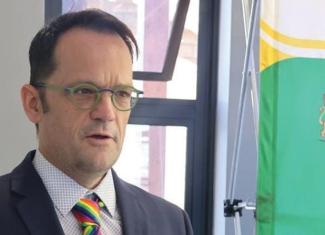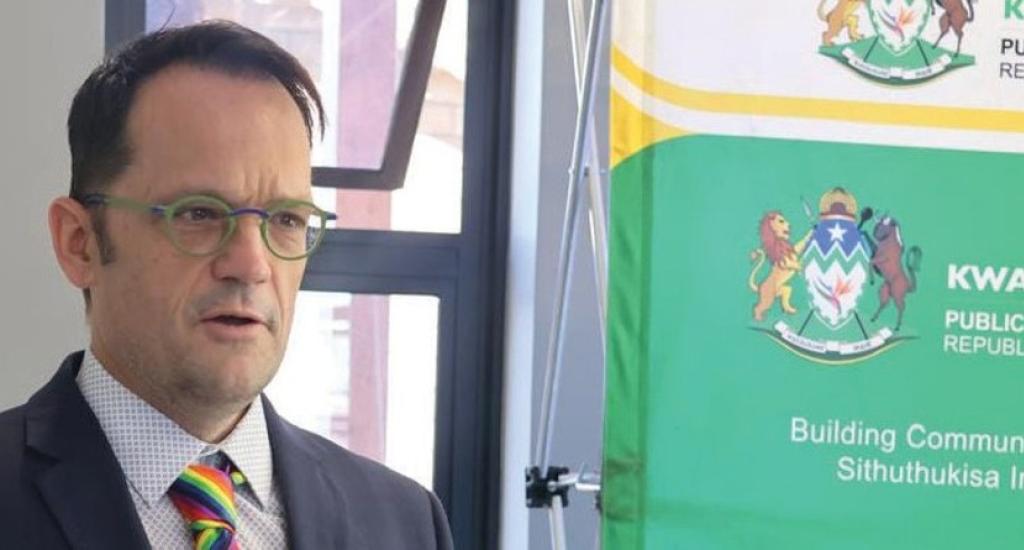Revitalising infrastructure:
MEC Martin Meyer’s bold vision for KwaZulu-Natal

KwaZulu-Natal’s MEC for Public Works and Infrastructure, Martin Meyer, has set himself the audacious target of turning around the fortunes of the beleaguered department. The department, which is responsible for infrastructure development and management of government property in the country’s second-most populous province, is battling on numerous fronts. Some of the head-winds faced by the department include demoralised and unmotivated staff members to billions in unpaid service provider invoices and construction mafia cartels demanding work and crippling infrastructure across the province. The work of the department is also saddled by financial constraints and red tape. During a recent sit-down interview with Public Sector Manager (PSM) magazine at his Durban office, Meyer remained calm as he pondered on the journey ahead.
Taking the helm: a whirlwind beginning
Reflecting on his unexpected appointment, Meyer described it as a rapid transition into one of the most demanding roles in the province. "It has been a whirlwind, a rollercoaster ride," he recalled. "I got called on a Tuesday at 17:00 to say I am being sworn in as MEC for Public Works and Infrastructure. It has not stopped since then; [I am still] finding my feet. It is a very large department with a large staff complement that does work all over the province. I am getting there." Despite the challenges, the MEC is buoyed by the support he has received.
Finding innovative solutions
Meyer acknowledges that budgetary constraints are a significant challenge for the department. "Budgetary constraints make it very difficult for us with all the challenges we face as a province. One of the many mantras that we have now adopted is that we have to learn to do better with less – and do more with less," he explained. He emphasises the importance of innovation, particularly in building infrastructure that is both cost-effective and resilient to climate change.
"We really have to be innovative in our approach to these challenges. For example, when a school had been washed away in floods, the old approach would have been to rebuild it to the same specifications, only for the school to be destroyed by floods two years later. We have to find ways to construct buildings that are climate resilient but within cost or making it even cheaper." The MEC acknowledged that the department has been slow in embracing technology but is determined to change this to improve service delivery.
He cited the issue of vandalised schools as an example: "It can take anything between four and six months to fix a door, which is unacceptable. In the Western Cape, it takes eight days to fix such things. I have said we have to use technology to have much faster turn-around times, be a lot more innovative in how we do things. That is going to be the approach."
One of Meyer’s key objectives is to establish an infrastructure agency within the department. The agency is expected to serve as a specialist body to advise all levels of government, including municipalities. This, he said, was because many issues arise at the local government level, but progress has been hindered by a lack of necessary skills, forcing them to hire expensive consultants. It will initially form a panel of experts to assist municipalities with infrastructure challenges as they arise.
Repurposing state-owned properties
The department is currently conducting an audit of its more than 13 000 properties, which include small parcels of land, schools, clinics, houses, buildings and even abandoned hotels. "Once we have identified a property, the first question we ask is: can it be repurposed and used by government? We are currently paying over R900 million on rentals for government departments. If we have a building two blocks away that we can fix up and move a department into that building, we will be saving money," he added.
If a building cannot be repurposed for government use, the next step is to assess its potential benefit to the community. The final option is to sell the property on 99-year leases or the open market, with a focus on disadvantaged communities. Meyer also highlights plans for public-private partnerships, including initiatives for student accommodation and community food gardens. "Our belief is that if something is not to the benefit of the department, it should not belong to the department," he asserted.
Boosting staff morale
The financial situation of the department is dire. The MEC attributed the issue partly to the fact that they carry out work for other departments but do not get paid for it, leading to an increasing debtors’ book and making it difficult to pay contractors.
Cutting red tape
Meyer acknowledges the difficulties that small businesses face due to excessive bureaucracy. "Red tape remains the biggest stumbling block. Over the years, government, in an effort to curb corruption, has put in place a lot more red tape, but it has unfortunately had the opposite effect; I think it has made corruption worse," he said.
He said they are collaborating with national government to streamline processes without compromising the fight against corruption.
"We are partnering with the national department to see how we can cut the red tape and make it much easier for small businesses. Currently, it is such an expensive exercise to tender with all the paperwork; you have to get experts to help you. The bigger companies always have an advantage over the smaller guys."
Meyer speaks positively about the cooperation within the provincial government, highlighting the collaborative spirit of the Government of Provincial Unity (GPU).
"The GPU has from the get-go been a very strong unity government. We have very good inter-departmental relationships," he said.
“We have regular meetings with other MECs. There is a strong willingness to find solutions. We come from four different parties with different ideas; we consolidate ideas and find solutions that we may not have considered before.”
Taking a stance against the ‘Construction Mafia’
On the issue of the ‘construction mafia’ Meyer stressed the importance of distinguishing between legitimate business forums and the syndicates. He committed to work with all legitimate groups.
“Not all business forums are mafia. We have had a strong stance; we will engage anyone that will engage us in peace. We will not engage anyone engaging us in criminality," said the MEC. ❖




